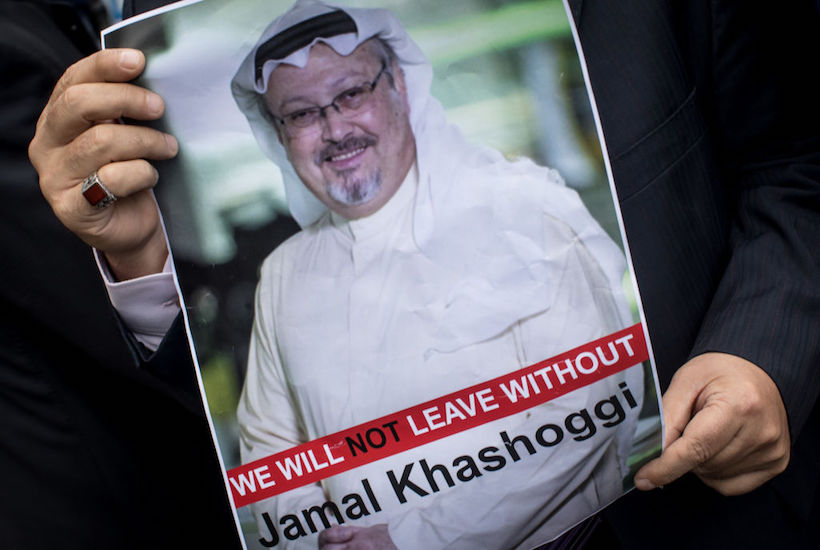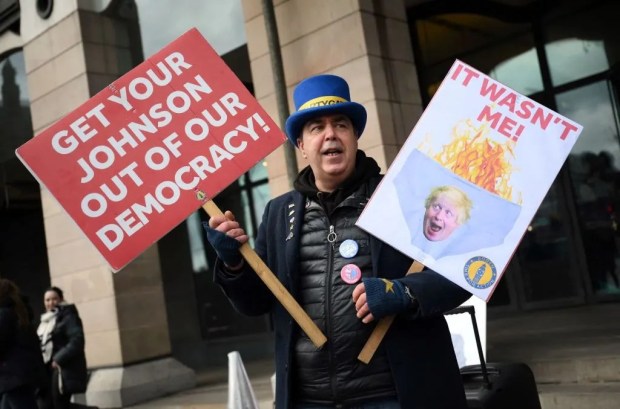Bryan Fogel seems to have done it all. It’s hard to think of a showbiz figure with a more varied career. He began as a stand-up and moved to play-writing and then to directing movies. In 2013, he reinvented himself as the producer of hard-hitting documentaries that focus on international scandals and cover-ups.
He talks to me via Zoom from Los Angeles about his latest movie, The Dissident.
‘I was seeking what my next film was going to be – something that spoke to human rights and freedom of expression. It checked all those boxes’.
The subject is the death of Jamal Khashoggi, the dissident journalist who was murdered in the Saudi embassy in Istanbul in 2018.
‘He’d left his country to be able to speak freely. His story was one I wanted to tell,’ says Fogel. ‘I became very emotionally connected to the subject matter.’
 Bryan Fogel with his academy award for ‘Icarus’ (Getty)
Bryan Fogel with his academy award for ‘Icarus’ (Getty)
Khashoggi had once been close to the Saudi ruling family but he fell out of favour when he began using his column in the Washington Post to criticise the regime. Fogel describes his movie as ‘a cinematic thriller’ but it’s also a romance that becomes a tragedy. Khashoggi had visited the embassy to complete the paperwork for his forthcoming marriage to Hatice Cengiz, an academic in her mid-30s. She stood on the pavement for 12 hours waiting for her fiancé to re-emerge, and she had no idea he’d been murdered within minutes of entering the building. The biggest challenge, Fogel says, was building trust with her and with the Turkish authorities who investigated the killing.
‘Hatice supported the film. That means so much to me.’
The documentary develops into a broader examination of the West’s relations with Saudi Arabia and it looks at the dangers faced by other dissidents. Does he expect viewers to take a particular course of action after the credits have rolled?
‘My goal is for people to see the film. What they choose to do is up to the individual.’
What are his hopes for the progress of democratic reforms in Saudi Arabia?
‘I’m not an expert on the region. It’s hard for me to comment about that. I’m a film-maker.’
Fogel built his extraordinary career from a combination of drive and talent. He was born and raised in Colorado.
‘My father was a lawyer. My mother was a mother. I didn’t come from any sort of creative Hollywood playwriting background. It was something I discovered.’
After studying sociology and psychology at university he moved to Los Angeles, at the age of 22, and worked as a stand-up.
‘Then I got into acting and that turned into writing while I figured out how I could create material that would allow me to be me. That eventually turned into writing a play that became a big hit. I was starring, producing and directing.’
The play, Jewtopia, is a romantic comedy with a sublime premise. A Jewish man wants to marry a Gentile woman who will help him forget his Jewish roots. His best friend is a Gentile who wants a Jewish wife because they’re great at taking responsibility and making decisions. Each teaches the other how to woo the perfect woman. The play opened in LA in 2003 and transferred to Broadway. The movie version, which Fogel directed in 2012, was a failure with both the critics and the public. How did he deal with the disappointment?
‘I have been very good at being able to not dwell so much in the past. Stay present in the moment. Failures have brought about changes for me, so I’ve always looked at everything as a learning opportunity.’
He started to rethink his career. From writing and directing comedy he embarked on a heavyweight investigation into the culture of doping in Russian athletics. This became his first documentary, Icarus.
‘At the time I couldn’t have fathomed that four years later I’d be on stage winning an academy award [for Best Documentary Feature, 2018]. That journey changed my life.’
He’s now working on two more documentaries and he’s about to direct a feature based in the UK. What advice would he give to someone wanting to follow in his footsteps?
‘Be nimble. And be able to pivot’.
Are there any documentaries he would recommend?
‘Man on Wire. It’s one of my favourites. Free Solo is extraordinary. And I love Searching for Sugarman. I like documentaries that don’t feel like a quote-unquote “documentary”.’
Got something to add? Join the discussion and comment below.
Get 10 issues for just $10
Subscribe to The Spectator Australia today for the next 10 magazine issues, plus full online access, for just $10.




















Comments
Don't miss out
Join the conversation with other Spectator Australia readers. Subscribe to leave a comment.
SUBSCRIBEAlready a subscriber? Log in